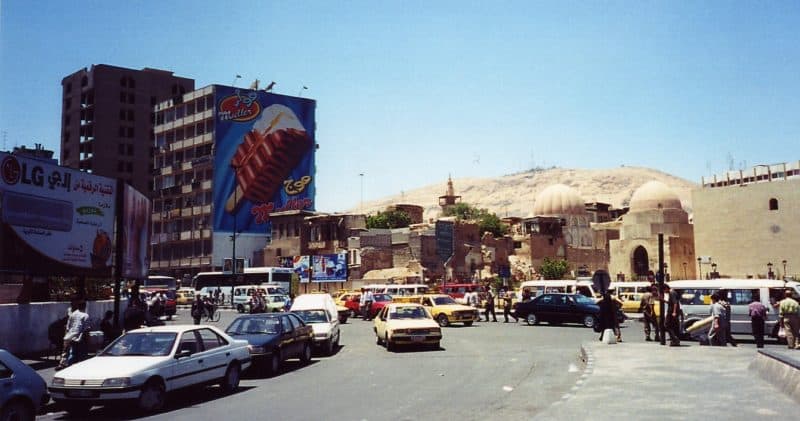Many Syrians have been awaiting this moment with dread. A further step down into bloody chaos and incipient civil war, a further step into the dark. Last Friday morning two car bombs exploded at security installations in Kafar Souseh, Damascus. At least thirty people were killed and over 100 injured.
Who’s to blame? There is no evidence of anyone’s guilt, and there won’t be any credible evidence while the criminal Asad regime remains in power and continues to lie and to block journalists’ access. This means that pro-regime people will follow the regime line and blame al Qaeda, and anti-regime people will blame the regime. I make no bones about it: I’m firmly in the anti-regime camp. Those who followed my writing before this year will know that I was once willing to give the regime the benefit of the doubt. Not any longer. This year I’ve been forced to admit that the regime is a lot less intelligent, a lot less sophisticated, than I thought. Back in February it had enough popularity to lead a genuine reform process. It’s entirely possible that Bashaar al-Asad, had he played this revolutionary year right, could have won a real election. But he didn’t play it right. From the start his regime slaughtered peaceful protestors and subjected thousands to torture, including children, even to death. Worst of all, the regime instrumentalized sectarianism in an attempt to divide and rule.
After months of attacks by armed Alawi gangs on predominantly Sunni lives and property there are now instances of “revenge” attacks on innocent Alawis, and tit-for-tat sectarian killings particularly in Homs and its surrounding countryside. All of this could have been predicted months ago. Of course, the mechanics of these killings is as obscure as that behind the bomb attacks in Damascus today. Some revolutionaries believe the regime is behind the killings of Alawis too, because it aims to spark a sectarian war which it thinks it can win. And we must not forget that sectarian war is still—to the credit of the Syrian people—not the dominant strain in the conflict. There are thousands of defected soldiers, many of whom have seen their comrades gunned down. If they had chosen to they could have attacked the minorities in a coordinated fashion. They haven’t. And the Alawi actress Fadwa Sulaiman is still leading demonstrations in the Sunni heart of Homs.
It’s debatable whether or not the regime can win a sectarian war, but it’s certain that it can’t win its struggle against the revolution for dignity. In fact the signs are piling up that the regime is losing by the day. Last week 60,000 revolutionaries took to the streets of Meydan in central Damascus. Thousands took to the streets of central Aleppo. It can no longer be said, therefore, that central Damascus and Aleppo are not participating in the revolution (the suburbs of these cities have been demonstrating for months). The regime’s response to the awakening of the two largest cities has been to escalate. Reports from Jabal az-Zawiyeh in Idlib province suggest that at least 250 people have been massacred there in the last three days, defectors and civilians alike. And the daily death toll of civilians across the country has risen to between 20 and 50.
Now this double bomb attack on Kafar Souseh looks very much like part of the regime’s response. It certainly plays into the regime’s hands, reinforcing the terrorism narrative on the day that the Arab League observers (very worryingly led by Muhammad ad-Dabi, who was Sudan’s intelligence chief during the massacres in Darfur) arrive in Syria. Apparently it took less than twenty minutes for the regime to “discover” that al Qaeda, backed by the United States and Israel, was behind the bombs. The regime’s ad-Dunya TV station even informed us that the exploding cars had pictures of bin Laden on their windows. Intelligent people will have as much trouble believing this story as they have believing Butheina Shaaban’s indignant insistence that torture never happens in Syria, or the lisping idiot-in-chief’s assertion that he would leave power if the people stopped loving him.
Witnesses claim that the streets around the bomb blast were closed off by security before the explosions. The oppositionist Muhammad al-Abdullah writes on his Facebook page that “Reliable sources leaked the news that the victims of the bombings in the security services building were innocent people detained during demonstrations and were transferred from prisons and detention centers to the military and security buildings to use as victims in the series of explosions planned in the coming days after signing the death protocol (the Arab League protocol) and the presence of Arab observers to let the world think that the Syrian revolution is a terrorist revolution.” The regime claims it received information from Lebanon two days ago that 200 al Qaeda operatives were crossing the border. Lebanon’s ex-prime minister Saad al-Hariri (admittedly an anti-Syrian politician) says “this is fabricated by the Syrian ministry and some of its tools in Lebanon.”
So choose the narrative that fits you best. This is the confusion into which the criminal and traitorous regime has led us.
This post originally appeared at Qunfuz.com.
By arrangement with Qunfuz.com.
